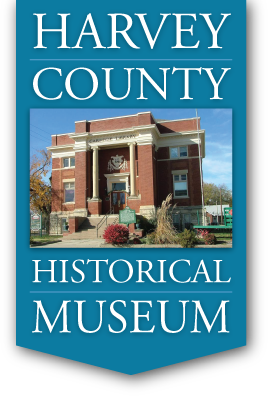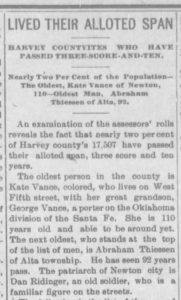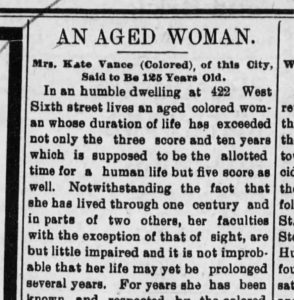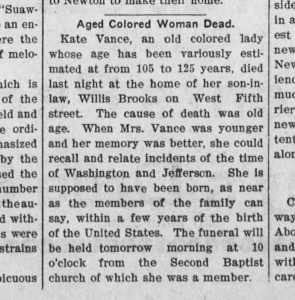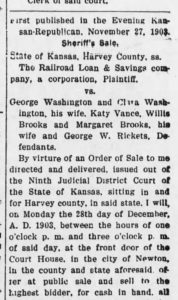by Kristine Schmucker, HCHM Curator
In 1922, Harvey County celebrated 50 years as a county. Efforts were made to recognize the “Old Settlers.” Lists with information on where the family came from, the date they arrived in Harvey County, and what township they settled in. Local photographer, W.R. Murphy took studio photographs of Old Settlers still alive which was included in the 1922 50th Anniversary Ed of the Newton Kansan. Descendants of deceased settlers could submit photos to be included in the issue.
One group of early settlers was not acknowledged included people of color. Many Black families saw the opportunity to own their own land through the Homestead Act of 1862 and worked hard to achieve this dream in Harvey County. Mary Rickman Anderson Grant with her husband and children were among Harvey County’s first Black residents, arriving in 1871. Others followed and made their lives in Harvey County, Kansas. The Vance/Brooks family also made Newton, Ks their home.
An “Aged Colored Woman”
In November 1902, Katie Vance, an “aged colored woman,” died after living through one century and parts of two other. Her brief obituary reported that “she could recall incidents of the time of Washington and Jefferson.” Her age was estimated between 110 to 125 years old at the time of her death in 1902.
She was declared “the oldest person in the county . . . colored, who lives on West Fifth Street.” in 1899. At that time, the next oldest was 92 year old Abraham Thiessen of Alta Township.
In 1901, the Evening Kansan Republican interviewed “the remarkable woman” and noted that “her faculties with the exception of that of sight, are but little impaired.” She was described as someone that “has been known and respected by the colored people of the city and within the memory of nearly all of them she has been an old woman.”
“A Stately Mansion and Broad Fields”
She began life as a slave on a plantation in approximately 1779. Her earliest memories were of “a stately mansion and broad fields in Virginia.” She did not know her parents. For newspaper article she noted:
“Of her parents she knew nothing. Her master and mistress, even if they knew, never deigned to enlighten her as to the whereabouts of her parents. . . she grew up. . . without a mother to love and watch over her.”
Throughout her growing up years, she “was employed in odd jobs about the house” along with a brother and sister. She never knew what it was to not work. She recalled; “if caught with a book in her possession, she was soundly slapped and the book taken from her.”
“Toiled from Sunrise to Sunset”
Change came to Katie’s life when the daughter of the plantation owner married a man by the name of McQuery. Katie was given to the newlyweds and moved with the couple first to Charlottesville, N.C. and later Kentucky. At first her duties were as a nurse for the couple’s children. Once the children grew up, Katie went to work in the tobacco factory and corn fields “where she toiled from sunrise to sunset, day in and day out.”
After the “cruel separation in Virginia,” she never saw her brother or sister again.
At the end of the Civil War, Katie continued working hard. One possible glimpse into her life at this time comes from a complaint filed by Katie Vance on November 2, 1868 with the Mississippi, Freedmen’s Bureau Field Office records, 1865-1872 against Jesy Bransfield for cotton owed to her. The cotton was “released and turned over to the plaintive.”
Married twice, her second husband, Wilson Vance, was also a slave on the McQuery plantation. She had four children that lived to adulthood, but by the time of the 1901 interview all had died. At that time, she knew of only one other living relative, a great grandson who was a railroad worker “out west.”
Several other “well known colored citizens of this city, were property of one Col. Elijah Sebree,” at a neighboring plantation, including Abe Weston and Willis Brooks, future son-in-law, both of whom would make the trip to Kansas with the Vance family.
“Equal Opportunities”
In January 1880, Vance with 31 others, including Weston and Brooks, “emigrated to sunny Kansas, where the negro was given equal opportunities with the white man in the race of life.” Katie Vance was already an elderly woman “about ready to shuffle off this mortal coil” at the time of the trip. When they arrived in Newton, the family consisted of Willis & Emily Brooks and a son, George Washington, and the elderly Wilson & Katie Vance. The Vance/Brooks family lived at 422 W 6th, Newton, Ks in a house described as a “shanty” for the next 20 years.
Wilson Vance died at the age of 105 in 1894. In 1897, the Vance’s remaining daughter, Emily, (Mrs.Willis Brooks) died. Willis Brooks remarried in 1898. Following the death of her husband and daughter, Katie continued to live in the house with her 81 year old son-in-law, Willis Brooks and his second wife, Margaret Harding Brooks.
By the time of the Evening Kansan Republican interview in January 1901, Katie was completely blind “although her memory seems as active as ever.”
Kate Vance died in November 1902. Her funeral was held at the 2nd Baptist Church, Newton, Ks where she was a member. She was buried in Greenwood Cemetery, Newton, Ks.
The final clues to Katie Vance’s remaining family appear in the legal section of the Evening Kansan Republican 11 December 1903 announcing a Sheriff’s Sale of their property. Willis Brooks died in July 1903. Although no obituary for Brooks was discovered, the Sheriff’s Sale lists George Washington and wife Clara Washington, possibly Katie Vance’s grandson, as well as Margaret Brooks, Willis’ second wife.
Sources
- Katie Vance complaint November 2, 1868 with the Mississippi, Freedmen’s Bureau Field Office records, 1865-1872.
- Newton Kansan, 23 June 1899, 1 August 1902.
- Evening Kansan Republican: 29 January 1901, 28 November 1902, 11 December 1903.
- Newton City Directories: 1885, 1887, 1902. Harvey County Historical Museum & Archives, Newton, Ks
- U.S. Census:
- 1870: Trenton, Todd, Kentucky
- 1880: Newton, Harvey County, Kansas
- 1900: Newton, Ward 4, Harvey County, Ks
- Marriage License Collection, Harvey Historical Museum & Archives, Newton, Ks, Groom Index.
- Willis Brooks married Margaret Harding 3 November 1898
